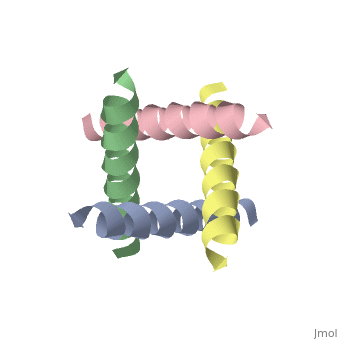1nyj: Difference between revisions
No edit summary |
No edit summary |
||
| Line 1: | Line 1: | ||
[[Image:1nyj.jpg|left|200px]] | [[Image:1nyj.jpg|left|200px]] | ||
'''The closed state structure of M2 protein H+ channel by solid state NMR spectroscopy''' | {{Structure | ||
|PDB= 1nyj |SIZE=350|CAPTION= <scene name='initialview01'>1nyj</scene> | |||
|SITE= | |||
|LIGAND= | |||
|ACTIVITY= | |||
|GENE= | |||
}} | |||
'''The closed state structure of M2 protein H+ channel by solid state NMR spectroscopy''' | |||
==Overview== | ==Overview== | ||
| Line 7: | Line 16: | ||
==About this Structure== | ==About this Structure== | ||
1NYJ is a [ | 1NYJ is a [[Single protein]] structure of sequence from [http://en.wikipedia.org/wiki/ ]. Full crystallographic information is available from [http://oca.weizmann.ac.il/oca-bin/ocashort?id=1NYJ OCA]. | ||
==Reference== | ==Reference== | ||
The closed state of a H+ channel helical bundle combining precise orientational and distance restraints from solid state NMR., Nishimura K, Kim S, Zhang L, Cross TA, Biochemistry. 2002 Nov 5;41(44):13170-7. PMID:[http:// | The closed state of a H+ channel helical bundle combining precise orientational and distance restraints from solid state NMR., Nishimura K, Kim S, Zhang L, Cross TA, Biochemistry. 2002 Nov 5;41(44):13170-7. PMID:[http://www.ncbi.nlm.nih.gov/pubmed/12403618 12403618] | ||
[[Category: Single protein]] | [[Category: Single protein]] | ||
[[Category: Cross, T A.]] | [[Category: Cross, T A.]] | ||
| Line 21: | Line 30: | ||
[[Category: solid state nmr]] | [[Category: solid state nmr]] | ||
''Page seeded by [http://oca.weizmann.ac.il/oca OCA ] on Thu | ''Page seeded by [http://oca.weizmann.ac.il/oca OCA ] on Thu Mar 20 13:03:21 2008'' | ||
Revision as of 14:03, 20 March 2008
| |||||||
| Coordinates: | save as pdb, mmCIF, xml | ||||||
The closed state structure of M2 protein H+ channel by solid state NMR spectroscopy
OverviewOverview
An interhelical distance has been precisely measured by REDOR solid-state NMR spectroscopy in the transmembrane tetrameric bundle of M2-TMP, from the M2 proton channel of the influenza A viral coat. The high-resolution structure of the helical backbone has been determined using orientational restraints from uniformly aligned peptide preparations in hydrated dimyristoylphosphatidylcholine bilayers. Here, the distance between (15)N(pi) labeled His37 and (13)C(gamma) labeled Trp41 is determined to be less than 3.9 A. Such a short distance, in combination with the known tilt and rotational orientation of the individual helices, permits not only a determination of which specific side chain pairings give rise to the interaction, but also the side chain torsion angles and restraints for the tetrameric bundle can also be characterized. The resulting proton channel structure is validated in a variety of ways. Both histidine and tryptophan side chains are oriented in toward the pore where they can play a significant functional role. The channel appears to be closed by the proximity of the four indoles consistent with electrophysiology and mutagenesis studies of the intact protein at pH 7.0 and above. The pore maintains its integrity to the N terminal side of the membrane, and at the same time, a cavity is generated that appears adequate for binding amantadine. Finally, the observation of a 2 kHz coupling in the PISEMA spectrum of (15)N(pi)His37 validates the orientation of the His37 side chain based on the observed REDOR distance.
About this StructureAbout this Structure
1NYJ is a Single protein structure of sequence from [1]. Full crystallographic information is available from OCA.
ReferenceReference
The closed state of a H+ channel helical bundle combining precise orientational and distance restraints from solid state NMR., Nishimura K, Kim S, Zhang L, Cross TA, Biochemistry. 2002 Nov 5;41(44):13170-7. PMID:12403618
Page seeded by OCA on Thu Mar 20 13:03:21 2008
